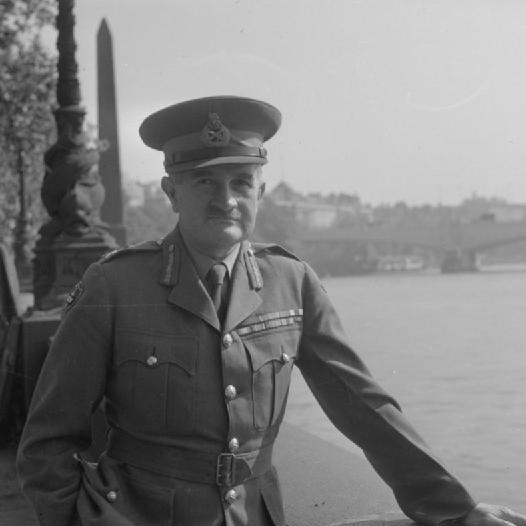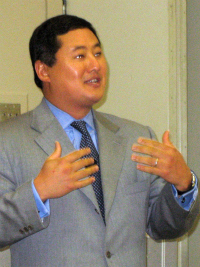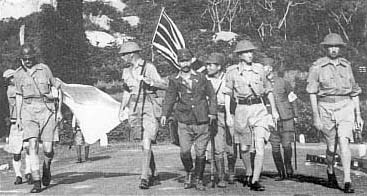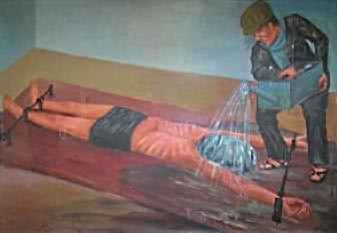Thomas E. Ricks's Blog, page 229
September 29, 2011
The perils of peacetime (I): Militaries laden with 'regulation and routine'

It's been so long that we've been at
peace that I fear we may have forgotten what it is like. But in preparation for
our wars ending (not with a bang but with a whimper), it is worth starting to
think about it, and how our militaries will be affected.
I bring this up because of a comment
I read the other day in General Sir Archibald Wavell's first
lecture on generalship:
It is in peace that regulations and
routine become important and that the qualities of boldness and originality are
cramped. It is interesting to note how little of normal peace soldiering many
of our best generals had-Cromwell, Marlborough, Wellington, and his
lieutenants, Graham, Hill, Crauford.
Who won the war in Iraq? (Here's a big hint: It wasn't the United States)

Peter
Van Buren also has a story
in Foreign Policy today about his own
experiences as a Foreign Service officer in Iraq.
By Peter Van Buren
Best Defense guest unraveller
When wars end, usually there is a
winner and a loser. Greeks burn down the city for the win; Trojans accept a
dummy horse for the epic loss, like that. As we near the end of the U.S. military
campaign in Iraq, and note the beginning of the State Department occupation
(the formal mission handover is Oct. 1), it is a good time to decide who
lost and who won, and what that means for the future of Iraq.
For the
minority, all-around Washington guy (now stopping off briefly to be Secretary
of Defense) Leon Panetta thinks we and the Iraqis sort of won. Leon said,
"But the bottom line is, whether it's diplomatic or whether it's military, we've
got a long-term relationship with Iraq. We've invested a lot of blood in
(Iraq). And regardless of whether you agree or disagree as to how we got into
it, the bottom line is that we now have, through a lot of sacrifice,
established a ... relatively stable democracy that's trying to work together to
lead that country."
Tune into your favorite
right-wing blog, and there is lots of mumbo-jumbo about the surge and
sacrifices and all that false patriotism stuff that no longer even makes for a
good country and western song.
On firmer ground, it is less clear
that the United States or Iraq won anything.
The United States lost 4474
soldiers (and counting), with thousands more crippled or wounded, spent a
couple of trillion dollars that helped wreck our economy at home, and did not
get much in return. Blood for oil? Only in the sense that one
of out of every eight U.S. casualties in Iraq died guarding a fuel convoy.
Iraqi oil
output is stuck at pre-war levels and will be for some time. A drop in
world oil prices would wreck the Iraqi economy. Despite Panetta's patter about
Iraq being a country willing to work with the United States, Iraq as a political entity
follows its own path, virtually
allied with Iran and unsupportive of American geopolitical dreams. The U.S.
government will sell some military gear to the Iraqis and make some money, but
in the end George Bush went to war and all we got was a low-rent
dictatorship turned into a low-rent semi-police state. As this is written,
it is even unclear if the United States will snag any permanent bases in Iraq, and whether
any troops will be allowed to stay on past the end of this December.
As for
Iraq being any sort of winner after being stomped on by the U.S. military, no.
Iraq had its civil society shredded, underwent eight years of sectarian civil
war, saw over 100,000 killed and is home now to a small but bustling al Qaeda
franchise. The United States left without brokering a deal between the Kurds and the Arab
Iraqis, leaving that kettle on full boil. The United States also failed to establish
stable borders for the Kurds, such that the Iranians shell "Kurdistan" from the
east, while Turkish
jets drop bombs in the west. Turkey is part of NATO -- imagine the U.S.
government sitting silently if Germany bombed Poland next week.
What
many people do not know is that one reason for the drop in sectarian violence
in 2008 was that both sides had done much of the killing they needed to do. The
fighting then was a civil war, Shia versus Sunni, and the death toll was high
enough on both sides to achieve the level of segregation and redistribution of
power desired at that time-they ran out of reasons for the war to continue at
that level of intensity. Ominously, however, the Sunnis and Shias did not fully
settle the score and so that pot sits bubbling on the stove as well.
Sectarian
tensions do still run high in Iraq, and the United States has been left
powerless to do anything about it. Except for some technical assistance and
perhaps some very low-key special operations help, the U.S. government has
taken a sideline seat to the sectarian violence over the last few months,
leaving the fight to the Iraqis. Whether zero or 3,000 or 10,000 U.S. troops stay
on in Iraq, it is unlikely that such a smaller U.S. force will intervene, given
that a larger one declined to do so.
The
tinderbox nature of things is such that the Iraqi government is seeking to ban
a television drama about events leading up to the historic split in Islam into
Sunni and Shiite sects hundreds of years ago. The Iraqi parliament asked that
the Communication and Media Commission, a media regulator, ban "Al
Hassan and Al Hussein" on the grounds it incites sectarian tensions and
misrepresents historical facts. "This TV serial includes sensitive issues
in Islamic history. Presenting them in a TV series leads to agitated
strife," said Ali Al Alaq, a politician who heads the religious affairs
committee.
Needless
to say, a glance at the daily news from Iraq will reveal the ongoing steady low
hum of suicide bombings and targeted killings that is now all too much a normal
part of life. The occasional
spectacular attacks (instantly blamed on al Qaeda by the United States) make
headlines, but every Iraqi knows it is the regular nature of these killings as
much as the death toll itself that is most disruptive to society. Iraq is
hardly a winner.
Who won
the war? Iran...
[[BREAK]]
Iran sat
patiently on its hands while the United States hacked away at its two major enemies,
Saddam, and the Taliban, clearing both its east and west borders at no cost to
Tehran. (Iran apparently reached out to the U.S. government in 2003, seeking
some sort of diplomatic relationship but, after being rebuffed by the engorged
Bush Administration, decided to wait and watch the quagmire envelope America).
The long slog both wars morphed into dulled even the reliably bloodthirsty
American public's taste for another war, and cooled off plans in Tel Aviv and
Washington for airstrikes against Iran's nukes (if Cheney couldn't edge the
United States into that fight, who can?).
The
Iranians also came to see that Iraq, like Lebanon, made for a nice proxy
battleground. By the time my tour in Iraq was wrapping up, the mine resistant
vehicles we traveled in could take a solid hit from pretty much anything out
there and get us home alive, except for one thing: Iranian-made roadside bombs
ealled EFPs. These shaped "explosively formed penetrating devices" fired a
liquefied white hot slug of molten copper that was about the only weapon that
really scared us. The Iranians were players in all parts of Iraqi society
post-2003, including the daily
violence. (Iranian proxy warfare in Lebanon is well documented in Robert
Baer's excellent book, The
Devil We Know: Dealing with the New Iranian Superpower[image error], which also advances the United States vs. Iran proxy
theory in general.)
Iran not
only lost an enemy when Saddam was hanged, it gained an ally in the new Iraq.
When the United States' last election surge withered away with the failure of
the March 2010 Iraqi contest to produce a government, Iran stepped in to broker
a settlement involving current PM Malaki (Malaki also serves as Minister of
Defense and Minister of the Interior but is not a dictator) and the jolly
Sadrists. Malaki, a Shia, happily recalls his days in exile in Iraq during the
Saddam reign while Sadr hid out as a religious "student" in Qom when he was on
the U.S. military's capture or kill list post-2003. Both men remain beholden to
Iran and continue to shift Iraq closer and closer to Tehran's policy positions.
Iran
has its own proconsul in Baghdad, well-known locally but not discussed much
in the west. The guy moved into the job after a tour as head of the Iranian
special ops Qods Force.
Yet
while strategic and political relationships are very important between Iraq and
Iran, it is the growing economic and social-religious ties that cement the
relationship and signify Iran as the real winner of the U.S. invasion. The raw
numbers tell a big part of the story: the two countries'
current annual trade is valued at $4 billion to $5 billion and growing,
with much more money changing hands on the black market.
On more formal terms, Iranian First
Vice President Mohammad-Reza Rahimi kicked off the most recent round of
goodwill on July 6, when he traveled to Baghdad to join the Iran-Iraq Joint
Supreme Economic Committee. Better yet, Iran
agreed to supply 9,400 barrels of "gasoil" a day to Iraq for power
generation. Iraq also signed a $365 million agreement to install
a pipeline network to import natural gas from Iran for power stations in
the country. The pipelines will eventually supply 25 million cubic meters of
Iranian natural gas a day to the Sadr, al-Quds and South Baghdad power stations
in the Iraqi capital.
Iraq's Foreign Minister, Hoshiar
Zibary said that Iran and Iraq would soon sign
an agreement to overcome "all the suspended problems between both countries."
"Iran is playing a positive role in Iraq and there is no objection for the
strengthening of relations between the two countries," Zibary said.
But while trade is good, and oil is
necessary, real money is in tourism. More specifically, religious tourism.
Iranian Shia pilgrims traveling to previously off-limits shrines in Iraq, is a
huge source of economic exchange. It also creates significant people-to-people
ties that Iran will be able to exploit long into the future.
Iranian travel agencies control religious
tourism to the Shia holy cities of Najaf and Karbala. The Iranian companies
are associated with local hotels, also owned by Iranians. The control by
Iranian companies extends to tourists from Lebanon who combine a visit to Iraq
with one to the religious site Mashhad, in Iran. The Iranian domination also
extends to security arrangement for protecting the tourists. That role is
filled by one company owned by one of the religious parties in Karbala.
Business is booming.
Najaf is in the midst of a hotel building frenzy in a bid to ramp up the number
of visiting pilgrims. While thousands of mostly Iranian religious tourists
already pass through Najaf every day on what are marketed as nine-day tours of
Iraq's holy Shiite sites, hoteliers and business groups in the city expect
hotel capacity, currently at breaking point, to double in the next three years.
Elsewhere, markets in rural Iraq
are filled with Iranian goods, especially fresh fruits and vegetables. While
the knitwear market is dominated by cheap Chinese stuff, other household goods
are conspicuously marked "Made in Iran" and are snapped up by consumers.
I saw a little slice of this during
my own time in Iraq. My Provincial Reconstruction Team (PRT) covered an area
that included the city and mosque of Salman Pak. Once a center for chemical
weapons production and secret police training under Saddam, Salman Pak is
better known to most Iraqis and Iranians as a historical and recreational area,
approximately 15 miles south of Baghdad near a peninsula formed by a broad
eastward bend of the Tigris River. It is named after Salman the Persian, a
companion of Mohammad, who is buried there.
Salman Pak is also site of the Arch of Ctesiphon, the
remains of the once majestic Persian Sassanid capital. Ctesiphon is one of the
largest and oldest freestanding arches in the world. Before the US invasion of
2003, the area was a popular day trip out of Baghdad, and even sported a
floating casino and villas for select friends of Saddam. My translator recalled
family trips to the area the way my daughters remember a visit to Disney,
leaving me a bit nostalgic for a time and place I never knew. The attraction
now for Iranian pilgrims is the mosque, once a well-known Shia shrine,
converted to a well-known Sunni shrine by Saddam and now once again a
well-known Shia shrine after sectarian violence post-2003 blew away most of the
Sunnis in the area.
On routine patrols through the
area, my PRT and Army would frequently see giant tour buses with Iranian
license plates and markings hauling tourists around the city. The Iranian
tourists would take pictures of our military vehicles and gesture at us as we
drove past, even as our soldiers scowled at them and pantomimed "no photos."
Nothing weirder than to be spending one's days freeing Iraq only to run into
Iranian tour agencies being the most obvious beneficiaries of that freedom. We
didn't know it then, but our tourists were offering us a glimpse of the future,
a picture of who the winners, and losers, were to be in our war.
As for Iraq, add it up:
--no resolution to the Arab-Kurd
issue,
--no resolution to the Sunni-Shia
issue,
--no significant growth in the oil
industry,
--a weakened U.S. presence more
interested in a Middle East land base and profitable arm sales than internal
affairs,
--and an increasingly influential
Iran seeking a proxy battleground against the United States and a nicely weak buffer state
on its formerly troublesome western border.
None of that tallies toward a
stable Iraq. Indeed, quite the opposite. Worst case scenario might look a lot
like the darkest days in Lebanon, with many of the same players at the table.
Peter Van Buren spent a year in Iraq as a State
Department Foreign Service Officer serving as Team Leader for two Provincial
Reconstruction Teams (PRTs). His first book, We Meant Well: How I Helped Lose
the Battle for the Hearts and Minds of the Iraqi People (The American Empire Project, Metropolitan Books), was published
this September. The views
expressed here are solely those of the author in his private capacity and do
not in any way represent the views of the Department of State, the Department
of Defense, or any other entity of the U.S. Government. The Department of State
has not approved, endorsed, or authorized this piece.
Quote of the day: Joining the military now is like emigrating to a new land

Robert Goldich,
meditating in the new issue of Daedalus on what
it means for today's youth to join the military:
They are, in a
sense, internal immigrants, emigrating from their familiar surroundings to find
more opportunity (economic and psychological) in the new and, in many ways,
utterly alien institutional terrain of the armed forces."
(P. 67)
September 28, 2011
Michael Yon on the grapes of war and a battlefield death in Afghanistan

Michael Yon has a strong account of the
death of a comrade, as well as some of the prettiest photographs of grapes I've
ever seen:
Chazray was terribly
wounded and had been thrown and landed on his face. The platoon was staggered
yet kept their bearing. There was no light, and the nightvision devices were
useless in the thick dust. Sergeant Wooden called out the names of his men in
the darkness. Near the detonation, nobody could see each other. Sergeant Wooden
called the names, and he called, "Clark!" Chazray was facedown. One arm was
gone and his legs were gone, and yet this man had the strength and presence to
call out from the dust and darkness saying he was okay. Chazray could still
hear. Chazray answered, "I'm okay," and Sergeant Wooden said his voice sounded
completely normal. Just normal Chazray. But everyone here knows that when
someone calls out and says they are okay, the sound of their voice only means
they are still alive. They found Chazray and put on tourniquets and unfolded a
stretcher. I was not in the dust and could see brave men carrying him back over
dangerous ground and Chazray said his arm tourniquet was too tight. He was in
great pain. Through nightvision I could see an Afghan Soldier rush in to help
carry Chazray.
Rest
in Peace, Chazray Clark.
Auftrag-static (VII): UK official tells Donnelly he has another think coming

It is interesting to see where this
discussion has led. Here is a response from a British government official to
yesterday's column by Tom Donnelly.
By "A. Gentleman Ranker"
Best Defense guest responder
I'm afraid
Tom
Donnelly's comments yesterday about the undeniable British failures of the
past have finally prompted me to send you this, which has been in my mind ever
since this discussion started. It's from Field Marshal Slim's Defeat
into Victory (chapter
on "Afterthoughts", pps 619-620 of the 2009 U.K. Pan edition). Slim was of course
himself a product of the "British Empire's military system" which, according to
the Brian Farrell quote cited by Donnelly "insist[ed that] the situation must
fit the plan at all levels":
My corps
and divisions were called upon to act with at least as much freedom as armies
and corps in other theatres. Commanders at all levels had to act more on their
own; they were given greater latitude to work out their own plans to achieve
what they knew was the Army Commander's intention. In time they developed to a
marked degree a flexibility of mind and firmness of decision that enabled them
to act swiftly to take advantage of sudden information or changing
circumstances without reference to their superiors. They were encouraged, as
Stopford put it when congratulating Rees's 19th Division which had
seized a chance to slip across the Irrawaddy and at the same time make a dart
at Shwebo, to "shoot a goal when the referee wasn't looking". This acting
without orders, in anticipation of orders, or without waiting for approval, yet
always within the overall intention, must become second nature in any form of
warfare where formations do not fight closely en cadre, and must go down to the smallest units. It requires in
the higher command a corresponding flexibility of mind, confidence in its
subordinates, and the power to make its intentions clear right through the
force...
Seems
a pretty good definition of (at least some parts) of Auftragstaktik to
me. It prompts three thoughts:
1. You don't need to be Prussian to develop Auftragstaktik.
There's no sign in Slim's writing that he's drawing on Prussian thinking, and
in fact this part of the chapter is entitled "New Techniques". Of course, all
things German were profoundly unpopular after the War, but given Slim's
reputation for intellectual honesty, I would expect him to have at least nodded
to the German experience if it had been a major influence on him. This
counterbalances what I often worry is a modern attitude verging on idolatry
towards Imperial and Nazi German military performance. I wonder how much this
positive view of the Wehrmacht in particular is still based on the post-war
Allied need to justify their poor initial performance against the Germans, on
the self-serving post-war accounts of German generals, and on an artificial
separation of German military actions from their political and moral context. I
also wonder how much this debate is fuelled by national stereotypes and
self-images, e.g. efficient and cerebral Germans, stolid and unimaginative
British, informal and unstructured Americans etc. [[BREAK]]
2. Slim does not say this
is the right approach for all forms of warfare, e.g. it's not
necessarily right for the European theatre, where formations may indeed fight en cadre (which I assume means aligned along a continuous front with
friendly units on either flank). He
links this approach (to which he doesn't give a distinct theoretical name) to
his experience of fighting in the broken terrain of South East Asia, and to
what he sees (in 1956) as the likely dispersed pattern of future
nuclear-conventional warfare. This makes me wonder whether mission command is
in fact the right approach for (e.g.) a campaign like Afghanistan, where
formations and commanders serve tours of 6 months - 2 years and then are
replaced by fresh ones (albeit often these days with their own experience of previous
tours). There has been criticism in Britain that many of the brigades in Helmand
have used their mission command freedom to take approaches very different from
their predecessors and successors, meaning perhaps, as with Vann's comments on
Vietnam, that we don't have five years' experience of Helmand, but six month's
experience ten times over. But maybe this is just a result of "higher command"
not having been able "to make its intentions clear right through the force..."?
3. Slim's book is of
course all about transformation (though he would doubtless have used a more
elegant word) - the title "Defeat into Victory" says it all. The British (and
imperial) military had of course a great deal of experience with this even
before it learnt to eat soup with a knife: Singapore was followed by Slim's
victories, Dunkirk led to D-Day, the Royal Navy pioneered convoys, carriers and
intelligence fusion as well as dreadnoughts, the army in the American colonies
developed greenjackets as well as redcoats etc. Throughout Slim's book he
emphasises the traditional, established nature of the skills and principles
needed for adaptation to changed and demanding circumstances, e.g. he
singles out discipline, which to him seems the essential basic military
quality. He implies that failure was as much a result of neglecting these
established virtues, as of neglecting to invent new ones (qv his scepticism
about the then newly-fashionable special forces). This implies that Eitan
Shamir is only partly right to argue that established armies (in Schilling's
words) "tend, when confronted with new cultures, to look to their past in an
attempt to proof that the 'new' is actually a well-known tradition of their
respective force": in fact, armies may genuinely need to return to the old in
order to deal with the new.
I am
something of an amateur in all these issues, but if Bill Slim thinks along
these lines, then I'm inclined to take his word for it. He was, after all, the
most successful British general of the Second World War, as well as the one
with the clearest writing style.
"A.
Gentleman Ranker," when he is not out on a spree, is a British official who has
worked on Iraq and Afghanistan issues and is now attached to a think tank.
Bush administration vs. the JAGs (II): The history of a strategic blunder

In response to my query
about whether there is a good history available of how the military's JAG corps
resisted the Bush administration's urgings to disregard the Geneva Conventions
and other laws, retired Air Force Reserve Brig. Gen. Ed Rodriguez suggested
reading chapter 12 of Charlie Savage's Takeover.
So I did. It is quite good on the point that tensions between JAGs and their
civilian overseers date back to Cheney's time as defense secretary.
But I still would like to read a
history of the conflicts over interrogation and such over the last 10 years. I
think the closest we come is parts of Jane Mayer's The
Dark Side. Also, retired Air Force Maj. Gen. Charles Dunlap had a good piece
in the summer 2010 issue of Texas Tech Law Review. Yet I think there
is space here for a narrative history, ideally by a lawyer, about this
confrontation, which I suspect carried unexplored significance for military
professionalism.
I haven't read Joseph Marguiles' Guantanamo
and the Abuse of Presidential Power, but one reader wrote in to say it
covers this subject well.
The Bush Administration's effort
to suppress independent advice from military officers was worse than a crime,
it was a strategic blunder. Good strategic decision-making comes from airing
differences, not hiding them. Of course, once civilians make a decision, the
military should salute smartly and execute with vigor -- as some Marine
recruiters are now doing by actively
recruiting gays.
Here also are some reading
recommendations from the friendly folks at the Lawfare blog: [[BREAK]]
"Understanding the Role of Military Lawyers in the War on
Terror: A Response to the Perceived Crisis in Civil-Military Relations"
Victor Hansen
New England School of Law
South Texas Law Review, Vol. 50, p. 617, 2009
Abstract:
This article is a response to an article
published in the UCLA Law Review by John Yoo and Glen Sulmasy which argued that
the military lawyers violated the principle of civilian control of the military
when they disagreed with some of the Bush administration's policies in fighting
the War on Terror. In this article, I will first show how Sulmasy and Yoo's
view of civilian control of the military is a narrow, inaccurate reflection of
the principle. I suggest that when Sulmasy and Yoo refer to civilian control of
the military, what they are really arguing for is politicization of the
military by one branch of government. Such a narrow view of civilian control of
the military is without historical precedent and is, in fact, antithetical to
our constitutional structure. In suggesting a more limited role for uniformed
lawyers, Sulmasy and Yoo contend that the Global War on Terror is so different
from wars of the past that many of the traditional legal norms do not apply.
The refrain, 'the events of September 11th changed everything,' has been a
constant theme by Bush administration officials to justify any number of
actions. While this refrain has been constant, I suggest that both the
applicability of the laws of war and the role for military lawyers - with
unique expertise in the development and implementation of these laws - are
still critical aspects of the War on Terror. This article suggests a more
accurate explanation for why military lawyers were opposed to many of the Bush
administration's proposals related to the treatment of detainees. Finally, this
article will discuss the ethical obligations of military and other government
lawyers, a matter not discussed by Sulmasy and Yoo.
Also, several folks indicated that the best account
of the civ-mil fight between the TJAGs and the administration is found in
Chapter 12 of Charlie Savage's book "Takeover."
Finally, there is a forthcoming article from
Deborah Pearlstein in the Texas Law Review that covers JAGs and the larger
question of civil-military relations, with the abstract as follows:
As U.S. counterterrorism activities continue to engage the
armed forces in profound legal and policy debates over detention,
interrogation, targeting and the use of force, recent legal scholarship has
painted a grim picture of the vitality of civilian control over the U.S.
military. Prominent generals leverage their outsized political influence to
manipulate the civilian political branches into pursuing their preferred course
of action. Bureaucratically sophisticated officers secure the adoption of their
policy judgments in the Executive Branch and Congress contrary to civilian
preferences. And misplaced judicial deference to military expertise on what is
necessary to regulate the special community of the armed forces exacerbates the
growing social separation between the military and the society it serves. The
question of how to distinguish expert advice from undemocratic influence that
has long surrounded the work of administrative agencies is made especially
complex by the unique constitutional role of the military. Before one can tell
whether civilian control is threatened, one must first have some understanding
of what it is. Yet for all the intense focus in recent years on the legality of
what the military does, where the modern military fits in our constitutional
democracy has remained remarkably under-theorized in legal scholarship. Moreover,
prevailing theories of civilian control in the more developed social and
political theory literature of civil-military affairs view the Constitution's
separation of powers - in particular, the allocation of authority over the
military to more than one branch of government - as a fundamental impediment to
the maintenance of civilian control as they take it to be defined. As a result,
there remains a significant gap in the development of a constitutional
understanding of the meaning of civilian control. This Article is an effort to
begin filling that gap, by examining whether and how the constraining advice of
military professionals may be consistent with our modern separation of powers
scheme.
I'm not positive, but I think she covers the particular
topic you mentioned.
Best,
Bobby
September 27, 2011
Auftrag-static (VI): Dudes, don't study how the Germans got it right in WWII, focus on how the British got it wrong

This guest column by my old friend
Tom Donnelly (yeah, we disagreed on invading Iraq, but he tends to be right
about good food, rock music and the Civil War) makes me think we should compile
a list of the "Top 10 books about the British getting it badly wrong in various
wars." In addition to the Singapore book he cites, I'd suggest Andrew Gordon's
The
Rules of the Game: Jutland and British Naval Command. Not sure which
World War I book to pick-there are so many-but maybe The
Middle Parts of Fortune, which should be better known. If I'd read it,
I probably also would suggest Cecil Woodham-Smith's The
Reason Why. It's been sitting on my shelf for several years.
By coincidence, I was re-reading General
Wavell's lectures on generalship last night over a robustly hopped IPA, and
was struck at his emphasis on endurance as a key quality. I suspect that's a
result of the blood and mud of the trench warfare of the Great War, and
resulted in the view that stolidity trumps adaptability.
Meanwhile, old Starbucks
provides his own overview of Auftragstaktik-fest.
Anyway, take it away, Tom D.
By Tom Donnelly
Best Defense guest right-wing
columnist
I have been following the discussion of auftragstaktik
with interest not only for the debate about the nature of mission command but
because it represents, if only indirectly, a larger conversation that needs to
be had about the institutions of the Army and the U.S. military.
That discussion -- which was constantly open and lively
during the years from Vietnam to Desert Storm -- has largely been set aside in
the post-9/11 era. While the force has adapted rather well to new tactical and
operational realities (and must wait for others, mostly civilians, to engage in
a much-needed reconsideration of American strategy), its institutions haven't
been as able to adapt. The primary cause may simply be that the combination of
a small force, a couple of long wars fought in one-year increments by too many
small-minded leaders (but civilian and uniformed), but that doesn't make the
result any different. Stephan
Schilling's recent guest column is a reminder that a system of mission command is something that not only enables gifted
leaders to shine but improves the standard of "average" leadership. A system is
the product of an enlightened institution, not just the emanation of an
individual genius.
Some of the elements for recreating the Army as an
institution are present in abundance - the cadre of young officers and NCOs who
have figured out how to adapt to the conditions they've found themselves in for
the past ten years is a priceless asset. On the other hand, if they never
supplement the on-the-job education they've had with something more reflective,
or, when that's done, never have the assets, opportunity or ability to
translate that into a re-fashioned leadership development system, that asset
will either be wasted or become a pinhole perspective. And, particularly in the
current budget environment, carving out the time, dollars and other resources
needed to reform, refit, and remake the Army as an institution is a monumental
task.
Nor is the pace of day-to-day operations likely to ease, at
least relative to the size of the service. No one knows what size the garrisons
in Iraq and Afghanistan will be in a few years' time, or where the next fight
will be. "No more land wars in Asia" is not a plan. The active Army is already
on a downward slope to 520,000 and it's near-certain that the path will get
steeper. The troop-to-task ratio is headed down, not up. The minimum price for
instituting any durable system of mission command would be a revived TRADOC,
one the Army's golden child but lately a neglected if not abused bastard. [[BREAK]]
Rather than figuring out how Guderian got it right, it may
be more instructive for American officers to study how the British got it
wrong. The British army, despite the many innovations developed in World War I,
could never escape the constant grind of constabulary deployments along the
imperial frontier; by 1942 they had been out-thought and out-fought by both the
Germans in Europe and the Japanese in Southeast Asia. And the intellectual rot
and become a moral rot: leaders quarreled with one another and did not trust
their subordinates. The British army lost, in part, because it expected to
lose. Brian Farrell's The
Defense and Fall of Singapore is an acidly honest appraisal of the
consequences of a failed military system: "The system produced the plans, men
and means," he writes. "It, not they, invited disaster....From 1921 to 1942 the
British Empire's military system insist[ed that] the situation must fit the
plan at all levels."
Indeed, the discussions in this space show general agreement
in regard to the nature of mission command. Paul
Yingling is surely right that the conditions of modern combat, particularly
for those who serve in the American military, call for a mission-command
approach; would any thoughtful veteran of the post-9/11 wars disagree? And a
dynamic leader needn't wait for perfect conditions to improve practices in his
unit.
But the challenge is rather in how to systematize, as best
as can be done, the Clausewitzian virtues, the coup d'oeil, the courage d'esprit.
What we call "mission command" the Prussian described as the product of a
cultivated temperament. The student of Napoleonic brilliance could still argue
that "it is the average result" - the
italics are in the original (or Peter Paret's version of it) - "that indicates
the existence of military genius."
Thomas Donnelly, Haupt-uber-director
of the Center for Defense Studies at the American Enterprise Institute,
graduated from the Sidwell Friends School in 1971, at the height of the Vietnam
War, despite regularly skipping Quaker Meeting to let his freak flag fly.
Next: Jeffrey Dahmer on how to cook!

Business
Week ran a
piece by the Donald Rumsfeld on how to hold a meeting. As a friend of mine
observes, they should have asked Robert Gates, who was a far better manager of
the Pentagon, while Rumsfeld's were known for being painful and unproductive.
The long-term costs of detainee abuse

Imagine how many Americans imprisoned
in the Third World are going to hear chilling comments like this
one endured by the Americans just released by Iran: "But
when they complained about their treatment, they said, the Iranian guards cited
how U.S. authorities at the military base at Guantanamo Bay, Cuba, dealt with
suspected terrorists there."
We've tried irresponsible defense, so now let's try a responsible version

I think I may have heard that line from Andrew XM.
CNAS, where I hang my hat, is holding an event on the morning of Oct. 7
at the Newseum on the military establishment after the defense budget collapse.
They call it "Responsible Defense in an Age of Austerity," but that sounds a
bit too think-tankish for my tastes. CNAS stalwarts Barno, Bensahel, and Sharp
will be flanked by Gordon Adams of the Stimson Center and Tom Donnelly of AEI.
Plus there will be some free food -- and not just boiled
potatoes, which would be the appropriate fare for this theme. In these austere
times, you should think twice before shunning such an offer.
Here's
the sign-up form. Tell 'em
Tom sent you. Maybe you'll get an extra potato.
UPDATE: Also, on Sept. 29, CSIS, where I wrote Fiasco, is holding a similar conference with many of the same suspects speaking. It isn't quite open to the public, but readers of this blog can contact their external affairs office and say they want in.
Thomas E. Ricks's Blog
- Thomas E. Ricks's profile
- 436 followers



